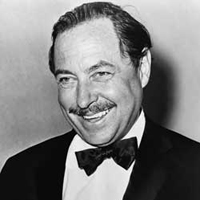Lord Byron's Love Letter by Tennessee Williams: Summary
There are four characters in this play: the spinster, a woman of forty named Ariadne, the old woman, perhaps her grandmother, the matron and her husband. The spinster and the old woman are in a dark living room. The spinster is sewing and the old woman is doing nothing. The doorbell rings. Perhaps someone has come to look at Lord Byron's love letter.

Tennessee Williams (1911-1983)
The old woman goes behind the curtain and the spinster goes to the door. She invites the matron, who has come for festival with her husband. She notices a canary in a very small cage. The canary is not alive, but stuffed. Her husband is outside on the street. She wants to look at Byron's love letter. This letter was written to the spinster's grandmother, Irenee by Byron. She met Byron on the steps of the Acropolis in Athens. He spent the final years of his wild life in Greece. He was exiled from England because of shameful talk about his involvement with his half-sister. He was fighting for freedom. He fought against the unbelievers. He swam across the Turkish strait and he also burnt the dead body of Shelley.
The matron goes out to call her husband, Winston Tutwiler. The old woman then asks the spinster to watch them carefully. The matron returns with her husband who has been drinking and wears a paper cap sprinkled with confetti. She tells him that the ladies are going to show them Lord Byron's love letter. The matron introduces her husband and herself to them.
When the matron wants to know how her grandmother met Lord Byron, the old woman replies that she met him on the steps of the Acropolis. She asks the spinster, Ariadne, to read them a passage from her grandmother's diary. The spinster, then says that, like many other young American girls of that day, her grandmother went to Europe. The old woman explains that she was just sixteen and very beautiful and asks the spinster to show them her picture. Looking at the picture, the matron exclaims that she was a lovely girl and that she looks like her daughter. Then Ariadne reads the diary.
Near the end of her tour, her grandmother and her aunt went to Greece to study the classic remains of the oldest European civilization. It was an early morning in Aril of the year eighteen hundred-and-twenty-seven and they set out to inspect the ruins of the Acropolis. The morning was pure, new and fresh. The sky was clear. The sun was barely up. A breeze disturbed her scarf and the plumes of her hat reflected wonderfully. The papers that morning had spoken of possible war, but it seemed unreal to her. Nothing was real except the beauty and mystery of the ancient city.
The carriage stopped, at the foot of the hill and her aunt was not too good. She had a sore throat that morning. Therefore, she preferred to remain with the driver, but her grandmother started to climb the steep flight of stone steps. Above her there was a man walking lamely. He turned now and then to observe behind him the lovely scenery. Actually, he was watching the girl behind him. Her grandmother was very much impressed by the greatness and grace of his body. He was Lord Byron, the handsomest man that ever walked the earth. When he had reached the very top of the Acropolis, he spread his arms like a young god. It seemed to her that he was Apollo who had come to earth in modern dress.
She walked slowly not to disturb his poetic imagination. But when she was close to him, he pretended not to see that she was coming. Then finally she faced him. Their eye came together. He told her that she had dropped her glove and indeed she had. As he returned it to her, his fingers, lightly pressed her palm. Then she became quite faint and breathless. She did not know if she should keep on walking. She moved unsteadily and leaned against the side of a column. The sun was very bright and hurt her eyes. Close behind her, she heard that voice again. She could feel his breath.
After this, the old woman tells the spinster not to read the diary any more. She is asked to show them the letter. The spinster says that a short while later Byron was killed in action, defending the cause of freedom. When her grandmother received the news of his death, she went away from the world and remained in complete loneliness for the rest of her life. It was natural for her to do so because a life was completed. She wrote a sonnet to the memory of Lord Byron. The spinster recites the poem. The band grows louder rapidly and passes by carelessly. Mr. Tutwiler, roused from his unconscious state, goes suddenly to the door. He asks his wife to follow him. Then the spinster quickly asks for some money. The matron does not pay any attention to them. She says that she must go because her husband has disappeared in the crowd. They want a little money for the display of the letter. Actually, they earn their living by showing the letter. The matron goes out. The spinster follows her to the door. There is unbearable light and sound. She closes the door and bolts it. The old woman says that they have gone without paying, and that they have cheated them. She is very angry. Then she tells her granddaughter, Ariadne that her grandfather's letter is lying on the floor.
